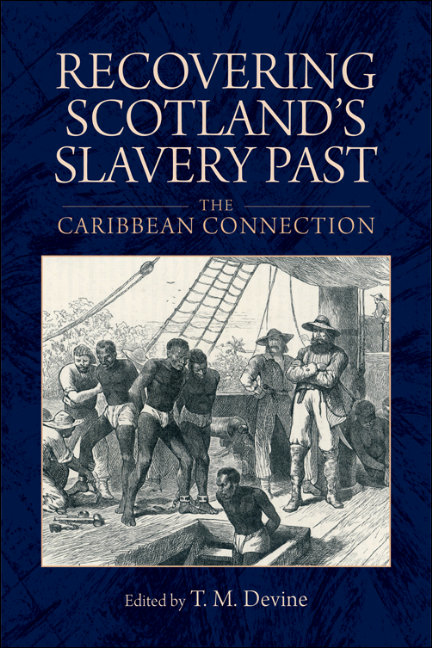Book contents
- Frontmatter
- Contents
- List of Illustrations and Tables
- List of the Contributors
- Acknowledgements
- Foreword
- map
- Introduction: Scotland and Transatlantic Slavery
- 1 Lost to History
- 2 Yonder Awa: Slavery and Distancing Strategies in Scottish Literature
- 3 Early Scottish Sugar Planters in the Leeward Islands, c. 1660–1740
- 4 The Scots Penetration of the Jamaican Plantation Business
- 5 ‘The habits of these creatures in clinging one to the other’: Enslaved Africans, Scots and the Plantations of Guyana
- 6 The Great Glasgow West India House of John Campbell, senior, & Co.
- 7 Scottish Surgeons in the Liverpool Slave Trade in the Late Eighteenth and Early Nineteenth Centuries
- 8 Scotland and Colonial Slave Ownership: The Evidence of the Slave Compensation Records
- 9 ‘The Upas Tree, beneath whose pestiferous shade all intellect languishes and all virtue dies’: Scottish Public Perceptions of the Slave Trade and Slavery, 1756–1833
- 10 ‘The most unbending Conservative in Britain’: Archibald Alison and Pro-slavery Discourse
- 11 Did Slavery make Scotia Great? A Question Revisited
- Conclusion: History, Scotland and Slavery 246
- Index
11 - Did Slavery make Scotia Great? A Question Revisited
Published online by Cambridge University Press: 15 December 2017
- Frontmatter
- Contents
- List of Illustrations and Tables
- List of the Contributors
- Acknowledgements
- Foreword
- map
- Introduction: Scotland and Transatlantic Slavery
- 1 Lost to History
- 2 Yonder Awa: Slavery and Distancing Strategies in Scottish Literature
- 3 Early Scottish Sugar Planters in the Leeward Islands, c. 1660–1740
- 4 The Scots Penetration of the Jamaican Plantation Business
- 5 ‘The habits of these creatures in clinging one to the other’: Enslaved Africans, Scots and the Plantations of Guyana
- 6 The Great Glasgow West India House of John Campbell, senior, & Co.
- 7 Scottish Surgeons in the Liverpool Slave Trade in the Late Eighteenth and Early Nineteenth Centuries
- 8 Scotland and Colonial Slave Ownership: The Evidence of the Slave Compensation Records
- 9 ‘The Upas Tree, beneath whose pestiferous shade all intellect languishes and all virtue dies’: Scottish Public Perceptions of the Slave Trade and Slavery, 1756–1833
- 10 ‘The most unbending Conservative in Britain’: Archibald Alison and Pro-slavery Discourse
- 11 Did Slavery make Scotia Great? A Question Revisited
- Conclusion: History, Scotland and Slavery 246
- Index
Summary
IN HIS MAGNUM OPUS, The Wealth of Nations, Adam Smith famously declared: ‘Under the present system of management, therefore, Great Britain derives nothing but loss from the dominion which she assumes over her colonies.’ Yet even Smith's authority could not lay to rest the question whether empire in the later eighteenth century was a drain on the metropole or a priceless resource of great material advantage to the mother country as it progressed towards economic transformation and industrialisation.
More recently, in 1944, Eric Williams published his seminal Capitalism and Slavery. In it he not only made a stimulating contribution to the intellectual debate which Smith's assessment had encouraged, but raised the issues to a more polemical and controversial level. His focus in part centred on the role of African slavery in the origins of the world's first Industrial Revolution in Britain. Williams himself described his book as ‘an economic study of the role of negro slavery and the slave trade in providing the capital which financed the Industrial Revolution in England’. Ironically enough, however, despite its later fame, if not notoriety, this thesis formed a relatively small section of a much broader study which also included the argument that mature industrial capitalism was ultimately responsible for the destruction of the slave system itself. At first the book provoked little published reaction in scholarly circles and only in the 1960s were significant responses forthcoming. They were unambiguously hostile. A series of thoroughly researched and carefully argued articles stretching from the 1960s to the 1980s sought to demonstrate that the ‘Williams thesis’ did not stand up to serious scholarly scrutiny. Thus, one estimate published in volume two of the Oxford History of the British Empire series concluded that the slave trade, though immense in scale, might only have added a mere 1 per cent to total domestic investment in Britain by the later eighteenth century. Scholarship seemed to have delivered a final verdict on the Williams ideas.
- Type
- Chapter
- Information
- Recovering Scotland's Slavery PastThe Caribbean Connection, pp. 225 - 245Publisher: Edinburgh University PressPrint publication year: 2015

